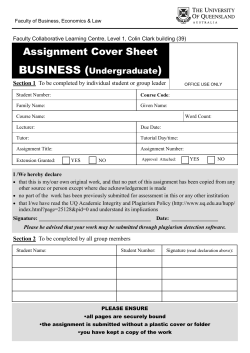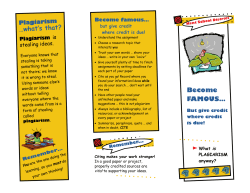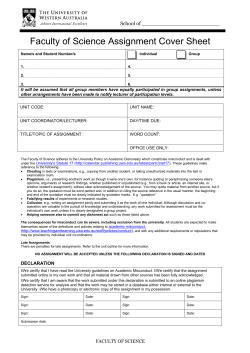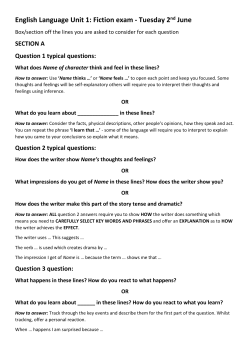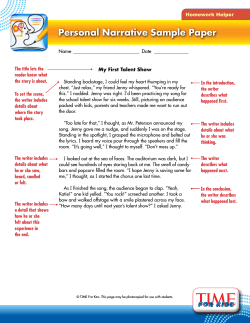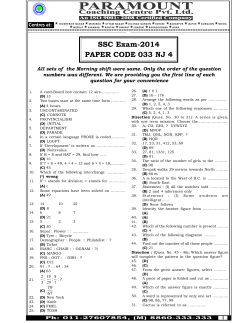
University of Washington Box 351525 Psychology Writing Center
University of Washington Psychology Writing Center http://www.psych.uw.edu/psych.php#p=339 Box 351525 psywc@uw.edu (206) 685-8278 How and When to Cite Other People’s Work Plagiarism occurs whenever you use the ideas or writings of another as your own without giving due credit. According to the Committee on Academic Conduct (1994, p. 23), a student commits plagiarism by: 1. Using another writer's words without proper citation. If you use another writer's words, you must place quotation marks around the quoted material and include a footnote or other indication of the source of the quotation. 2. Using another writer's ideas without proper citation. When you use another author's ideas, you must use a citation to indicate where this information was found. Your instructors want to know which ideas and judgments are yours and which you arrived at by consulting other sources. Even if you arrived at the same judgment on your own, you need to acknowledge that the writer you consulted also came up the idea. 3. Citing your source but reproducing the exact words of a printed source without quotation marks. This makes it appear that you have paraphrased rather than borrowed the author's exact words. 4. Borrowing the structure of another author's phrases or sentences without crediting the author from whom it came. This kind of plagiarism usually occurs out of laziness: it is easier to replicate another writer's style than to think about what you have read enough to be able put it in your own words. Below are examples of unacceptable and acceptable paraphrasing (Hacker, 1989, p. 171): Original: If the existence of a signing ape was unsettling for linguists, it was also startling news for animal behaviorists. Unacceptable borrowing of words: An ape who knew sign language unsettled linguists and startled animal behaviorists. Unacceptable borrowing of sentence structure: If the presence of a sign-language-using chimp was disturbing for scientists studying language, it was also surprising to scientists studying animal behavior. Acceptable paraphrasing: When they learned of an ape's ability to use sign language, both linguists and animal behaviorists were taken by surprise. 5. Borrowing all or part of another student's paper, or using someone else's outline to write your own paper. 6. Using a paper writing "service" or having a friend write the paper for you. Regardless of whether you pay a stranger or have a friend do it, it is a breach of academic honesty to hand in work that is not your own or to use parts of another student's paper. Copyright 1997, University of Washington howtocite.pdf University of Washington Psychology Writing Center http://www.psych.uw.edu/psych.php#p=339 Box 351525 psywc@uw.edu (206) 685-8278 Consequences of Plagiarism at the University of Washington According to the College of Arts and Sciences, "an instructor need not give credit for work which is the product of cheating, plagiarism, or other academic misconduct. However, the lowering of a course grade is not appropriate as a disciplinary sanction." Put simply, a plagiarized paper deserves a grade of zero. Another course of action is to refer the case to the College Disciplinary Committee and give the student a grade of Incomplete until the matter is resolved. The result of a plagiarism conviction is usually academic probation. For more information, see the Statement of Academic Responsibility in the UW Bachelor's Degree Handbook. How to Avoid Plagiarism Understand your subject! Often students will want to recopy entire sections of a scientific paper -- with or without crediting the original author -- because they don't really understand what they are writing. If you can't put the information into your own words, you aren't ready to write about it. To learn how to paraphrase what you want to write, try to explain it to someone else without referring to your source. Use others' ideas or writing as support for, not in place of, your own ideas. If your ideas come directly from another source, cite that source. When taking notes for a paper, always distinguish your ideas from those of your source. Establish a consistent pattern. For example, write information obtained from another source in brackets or parentheses, and write your own ideas without brackets. Or use different colors of ink to distinguish between original and non-original ideas. Always paraphrase unless you are quoting directly. Rework an idea and shorten it. If the idea is new, or not common knowledge, cite the source. When to Use Quotation Marks Use quotation marks whenever you use someone else's words, but use direct quotes sparingly (e.g., to support your point with the words of an authority, or when original wording is unusual, strong, or characteristic of the speaker). Writing in your own words, using a few quotes to strengthen your main points, shows that you understand your topic. Stringing quotes together suggests that you don't. Arguments made in scientific writing rarely focus on the specific words used in the source material -unlike arguments made in literary criticism, for example -- so quotes are seldom used in scientific writing. When to Use Footnotes or Citations Anytime that you quote someone, you must refer to the source and exact page number. If you are paraphrasing another writer's ideas or opinions, or information that is not common knowledge, you must cite the source. Citations are important, not only because they give credit to the original author, but also because they allow your reader to find the original information. References Committee on Academic Conduct. (1994). Bachelor's Degree Handbook, University of Washington. Hacker, D. A. (1989). A Writer's Reference. New York: Bedford Books of St. Martin's Press. Copyright 1997, University of Washington howtocite.pdf
© Copyright 2025

